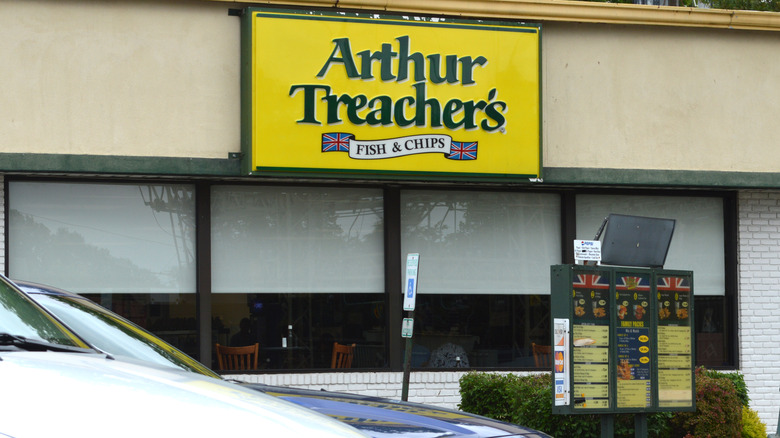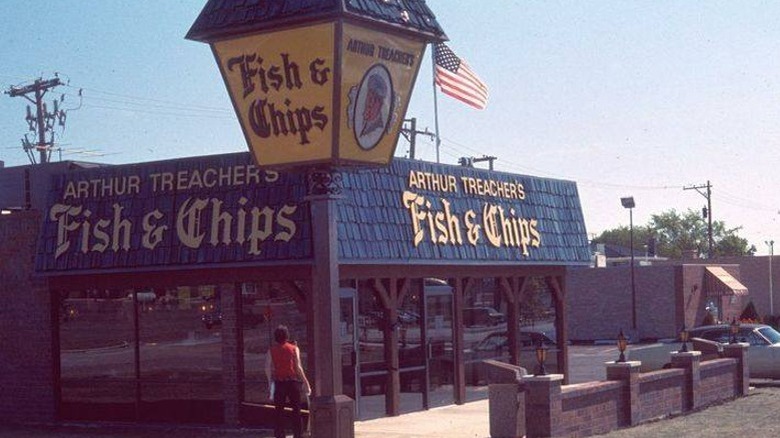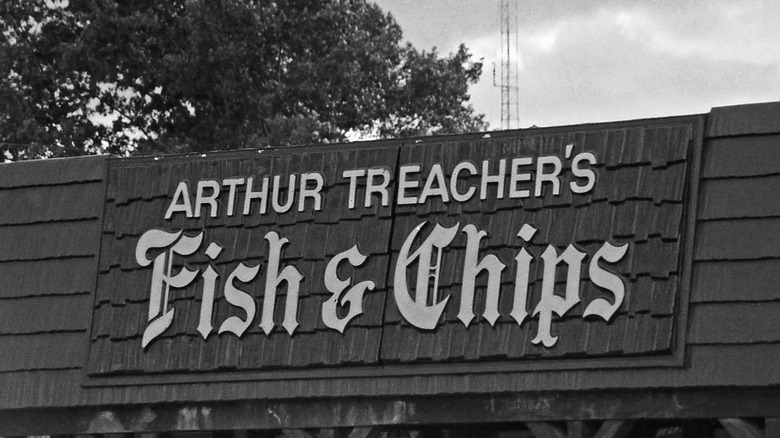The Rise And Fall Of Arthur Treacher's Fish And Chips
Fish and chips are a stereotypical English food, similar to how you may associate hamburgers with Americans. For those of you who have only heard of fish and chips by name alone but have never seen the actual thing, it's basically breaded and fried fish served with thick-cut fried potatoes known as "chips," or what we know as French fries.
But while the Brits' love for fish and chips may sound like something you'd hear being used to lampoon U.K. culture, the truth is that the English really, really do love their fried fish. UK Fisheries estimate that are over 10,500 fish and chip shops across the United Kingdom, all serving up an astounding 167 million fish and chip meals per year. In fact, so beloved is this deep-fried dish that, during World War II, fish and chips were among the only meals not rationed for the war effort, as the government feared a loss of morale if people had to give up the classic comfort dinner.
Needless to say, a meal of fried haddock or cod, served alongside some French– er, we mean chips—is something that many English people look forward to as a comforting and warm meal It seems, however, that there was a very brief time when Americans found that they had a taste for fish and chips too. So much so that one very particular restaurant by the name of Arthur Treacher's opened to serve a public hungry for fish and fries.
What was Arthur Treacher's Fish and Chips?
To our younger readers, you may be wondering what the heck Arthur Treacher's was. To our somewhat older readers, you probably have a few memories of driving by one of them every now and then. Just what is Arthur Treacher's and why does it have such an interesting spot in American fast-food history?
According to the company's archived website, Arthur Treacher's was founded in Columbus, Ohio in 1969 by a group of individuals, including Wendy's founder Dave Thomas. The idea behind Arthur Treacher's was simple: offer customers a meal they couldn't find anywhere else. After all, everyone was selling burgers, so why not try to stand out by selling fish and chips? The concept was a successful one, as Arthur Treacher's Fish and Chips expanded to an incredible 800 stores across the country throughout the 1970s. Americans seemed to really dig fish and chips back then.
It wasn't just that people liked the taste of the company's seafood that made it so popular. Many celebrities of the day helped to sponsor or promote the restaurant throughout the country, such as Ed Sullivan and Bob Hope. In fact, the real Arthur Treacher, a famous actor in American and British cinema, also helped to promote the restaurant. Treacher was known for showing up to restaurants in a double-decker bus, which helped to add to the authentic British feeling that the restaurant was going for.
Time was against Arthur Treacher's
Although Arthur Treacher's may have been popular in the 1970s and early 1980s, time wouldn't be as kind to the company as it was to others. A combination of changing tastes and geopolitical problems would cause the fall of one of the most unique restaurants in the fast-food market.
During the 1970s, Iceland and the United Kingdom were engaged in the "Cod Wars," or a series of territorial disputes regarding fishing territories between the two countries. As the United Kingdom could import large amounts of cod to the United States (and by extension places like Arthur Treacher's), the price of cod during this time became incredibly expensive. At the end of the dispute, British long-distance fishing had sufficiently ended, meaning that cod could no longer be imported as cheaply as it was before. To complicate things more, people's interest in fish and chips eventually waned, with consumers moving on to more elaborate, fancier items offered by more mainstream companies.
Even after several attempts to maintain its position and revitalize itself, Arthur Treacher's collapsed, leaving only a few scant restaurants operational. All may not be lost for Arthur Treacher's, however. Nathan's Famous, according to Nation's Restaurant News, has plans to revitalize the former fish and chips company by reimagining it as a "ghost kitchen" and expanding its menu to include not just its famous fish and chips but other types of meat and seafood as well.


